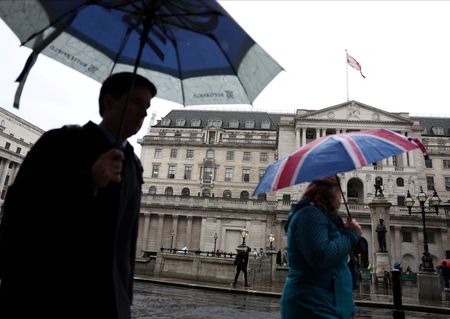By William Schomberg
LONDON (Reuters) – An unexpectedly sharp inflation jump in Britain has shone an even brighter spotlight on the Bank of England’s decision on Thursday whether to become the first of the world’s big central banks to raise interest rates after the pandemic.
Data on Wednesday showed consumer price inflation jumped to 5.1% in November, its highest level in 10 years, from 4.2% in October.
Investors, who had thought the super-contagious Omicron variant of the coronavirus meant there was little chance of a rate rise this month, responded by putting a 60% chance on the BoE raising rates to 0.25% from 0.1% at its policy meeting.
“This makes tomorrow’s interest rate decision look closer, but on balance we think the Bank of England is more likely to keep rates at 0.1% until it learns more about the Omicron situation,” said Paul Dales, an economist at Capital Economics.
By contrast, George Buckley at Nomura said stronger-than-expected growth in factory gate prices, alongside consumer price inflation, added to the case for a rate hike announcement at 1200 GMT.
He said consumer price growth could hit 6% in April, three times the BoE’s 2% target.
“We continue to think the Bank will raise rates by 15 basis points tomorrow,” Buckley said in a note to clients.
The International Monetary Fund on Tuesday urged the Bank not to succumb to “inaction bias”.
However, Buckley said there was still a chance that a “flash” preliminary survey of purchasing managers among British manufacturing and services firms – due to be published at 0930 GMT – could change expectations about a rate hike.
The British central bank is further along the road towards removing its coronavirus emergency stimulus than the U.S. Federal Reserve, which was expected to announce on Wednesday that it would speed up the phasing out of its bond-buying scheme, a precursor to a first rate hike that is expected only next year.
ECB AND JAPAN
The European Central Bank, which has signalled it does not expect to raise rates in 2022, is due to announce the outcome of its last policy meeting of this year shortly after the BoE on Thursday.
The Bank of Japan follows on Friday. It is considering an early end to an emergency loan programme but is set to continue supporting the economy with huge money-printing and a pledge to keep long-term borrowing costs capped at zero.
With pandemic-related inflation pressures building fast, and compounded in Britain by a post-Brexit shortage of some workers, the BoE has made clear in recent months that it felt the time to act was approaching.
But it confounded investors in early November when it did not raise rates, saying it instead wanted more time to be sure that the end of the government’s job support scheme had not triggered a jump in unemployment.
Data subsequently suggested Britain’s labour market suffered no hit from the end of the furlough scheme, seemingly leaving the way clear for the Bank to make its move – until the emergence of the Omicron variant of the coronavirus.
Michael Saunders, one of the two members of the BoE’s nine-strong Monetary Policy Committee who voted for a rate hike in November, said this month that it might make sense to wait for more clarity on Omicron before pressing ahead.
The jump in inflation has now caused the pendulum of sentiment to swing back again, although expectations of a rate hike are not as strong as they were before the BoE’s November announcement.
Investors on Wednesday were putting a roughly 60% chance on a 15 basis-point hike on Thursday, up from about 33% after Saunders’ speech on Dec. 3.
J.P. Morgan economist Allan Monks said he expected the BoE would sit tight because of the uncertainty about Omicron. But that would increase the probability of faster policy tightening next year as more booster jabs are administered and the economic hit from Omicron fades.
“In this event, the BoE will need to carefully manage its communications about the pace of tightening,” Monks said.
(Writing by William Schomberg; Editing by Kevin Liffey)











